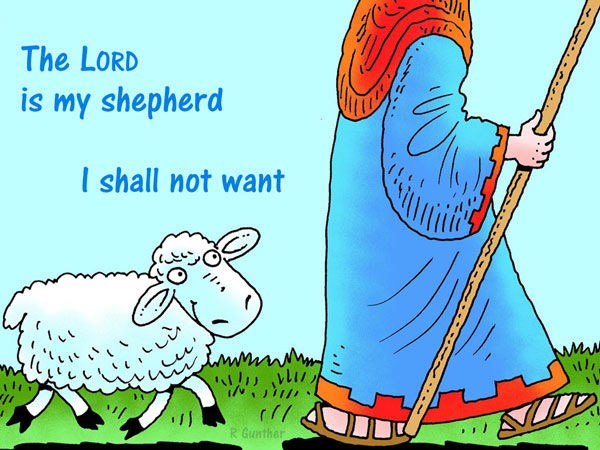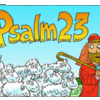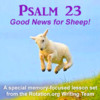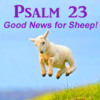Psalm 23
Good News for Sheep!
A Rotation.org Writing Team Lesson Set
Bible Background and Lesson Objectives
Scripture
Psalm 23 (NRSV)
See the notes below about the interesting differences between various translations and our philosophy of teaching one of the versions that students will most likely hear over the course of their lives.
Memory Verse: The entire Psalm is our memory verse.
Lesson Objectives
- In every lesson in this set, students will memorize Psalm 23 to the best of their ability through a variety of fun memorizing activities.
- Students will learn the meaning of Psalm 23's many metaphors (including green pastures, still waters, darkest valley, table, cup, etc.) and understand what it means to be a "sheep" ~ a follower of the Good Shepherd.
The Importance of Psalm 23
Psalm 23 is arguably the most important and beloved scripture in the Old Testament, if not the entire Bible.
- Important because its intimate and memorable words offer a complete and Christ-like understanding of God's love and how it is at work in our lives. Psalm 23 is The Good News in poetic form.
- Beloved because its powerful and assuring poetry is so easily remembered and relied upon over the centuries by all those in need of green pasture and still water, those who find themselves in dark valleys, and all who look forward to dwelling in the house of the LORD.
Given the unique place and importance of Psalm 23:
- We strongly encourage every Sunday School, traditional or Rotation, to devote a minimum of three lesson times to learning the psalm. Four or five would be better, and each lesson in this set is so creatively different that repetition is not a problem.
- Each workshop in the set takes its own unique approach to memorizing Psalm 23. Unlike typical "memory verse" activities, our Psalm 23 memory activities will be the main activity of each lesson.
- There are so many important insights into the meaning of various words, phrases, and verses in this psalm that they cannot all be taught in one lesson plan. Thus, you'll find many of the key meanings repeated over several lessons, and you'll have the opportunity to focus on certain words/metaphors that you wish to emphasize.
 To help guide teachers and students in the classroom, we've created a condensed summary of the "meaning" of the various words/images in Psalm 23. This "Teacher's Guide to Psalm 23" can be used in any lesson. We've left it as an editable WORD DOC so leaders can modify it and change the translation as desired.
To help guide teachers and students in the classroom, we've created a condensed summary of the "meaning" of the various words/images in Psalm 23. This "Teacher's Guide to Psalm 23" can be used in any lesson. We've left it as an editable WORD DOC so leaders can modify it and change the translation as desired. - The set includes details of a worship-based celebration at which the children will be called upon to recite the psalm together and be recognized for their memorization after completing their studies. One of the goals of this ceremony is to encourage classroom attendance.

Psalm 23: God is the Good Shepherd and we are his beloved sheep
Isn't it amazing that a song written 3000 years ago about sheep and a shepherd is still so beloved and powerful here in the 21st Century? Even if the only sheep you've ever seen was in a petting zoo, the words of Psalm 23 still resonate in souls longing for guidance and assurance, and it does so in a way that few scriptures do.
You only need to know what a sheep is like to understand how God views us, and thus, what a wonderful thing it is that God cares for ridiculously defenseless and hairy creatures like us.
- Sheep are not the brightest animals.
- Sheep need to be led to food and water.
- Sheep need rest and are easily scared.
- Sheep are easy prey.
- Sheep wander and get lost.
But the LORD is our shepherd, says the psalmist. "We fear no evil, ...for YOU are with me." It is the central promise of the psalm and all of scripture. It is "Good News to Sheep" indeed.
Everything we need to know about God and our life
is summed up in the good news of verse 1:"The LORD is my shepherd, I shall not want, I lack nothing, I have all I need."
The One who gave you life,
and guides your life,
and laid down his life for you,
the One who restores you by finding and comforting you when you are afraid or lost,
This shepherd, guide, and savior is all you need.It is not "IF" or "WHEN" the LORD is your shepherd
the LORD "IS" our shepherd -- it's who God is.
...even in the darkest valleys, even in the shadow of death.At the numerical center* of the psalm are the words
"for you are with me."
This shepherd is not distant. This is "God with us" (Emmanuel).
Yahweh restores, leads, prepares, and pursues us.
It is the sum of all we need to know about God and about ourselves.
And it is the example of how we are to care for others.
*re: numerical center -- see the word study below for more details.
"The LORD is my shepherd" is revolutionary when you consider that those words were written in a time when gods lived on mountaintops and threw thunderbolts. And they are no less revolutionary today in a world that worships the gods of power and the pursuit of "things."
"I shall not want" speaks as powerfully now to people hungering for meaning in the presence of abundance, as it did to the countless generations who endured famine and hardship.
“I am the good shepherd," Jesus said, confirming the good news of Psalm 23 in John 10. And then he added the only line that could possibly make Psalm 23 any more wonderfully complete than it already is, "and the good shepherd lays down his life for the sheep.” John 10:11
It is our honor to give the gift of these words to our children.
Which Translation Should We Use?
A quick comparison of six different translations,
and a recommendation to teach with a traditional version...
As you can see below, some translations are more "familiar" than others. And as you will learn in the word study, the differences in translation arise from the richness of the original Hebrew itself. While the variety of word choices is powerfully illuminating, when it is time to MEMORIZE a particular version, we strongly encourage you to select a version most students will likely hear throughout their lifetimes, so that when they do hear Psalm 23 used in the culture, in other churches, in media, and at funerals (where it is almost always read), their scripture and lesson memory will be refreshed, and the power of these words will resonate in their souls. The traditional version they will most likely hear will sound like the KJV and NRSV, and perhaps the NIV, and not so much like the Contemporary English, Good News, or New Living translations.
KJV 1 The LORD is my shepherd; I shall not want. | New Revised Standard 1 The LORD is my shepherd, I shall not want. |
1 The LORD is my shepherd, I lack nothing. |
Contemporary English Version 1 You, LORD, are my shepherd. I will never be in need. | Good News Bible 1 The LORD is my shepherd; I have everything I need. | New Living Translation 1 The LORD is my shepherd; I have all that I need.
|
"Still" waters or"quiet" waters ![]()
"Peaceful water" or"quiet pools" or"peaceful streams ?
"Restores my soul" or"refresh my life" or"renews my strengths" ?? ![]()
All of these translations are correct because the Hebrew words themselves in Psalm 23 are rich and intriguingly open to interpretation. Some are minor choices, but some have major implications. For example, "restores my soul" takes us in a more theological direction than "refresh" because "restores" suggests the restoring of our brokenness. Whereas "refresh" in English suggests a psychological condition, someone worn out by life and stress. Both are acceptable translations and add the kind of remarkable depth to Psalm 23 that has made it the most memorized scripture in the Bible.
It's important to keep in mind that Psalm 23 was originally the lyrics to a song. ("Psalm" means "song.") In other words, it's a poem whose words are meant to be thought-provoking, imaginative, and moving. It's not meant to be bound up and bolted down by "translation correctness." It is perfectly okay if today you feel God "restoring your soul" and tomorrow "renewing your strength." It's okay if you hear God telling you through these words that you will dwell in his house "forever" even though the original phrase is "my whole life long." Holy insights are not confined by the words of scripture, they are inspired by them. Throughout the lessons in this set, you will have ample opportunity to expand your student's understanding of the rich meaning of these incredible images.
See the Word Study Notes below for more interesting details and shareable insights.
Word Study Notes
Alongside the emphasis on memorizing Psalm 23, we have the honor of explaining what these verses mean, and that's no "pat" answer with Psalm 23! Every phrase and verse presents us with fascinating translation options -- the sources of which are the rich possibilities of the Hebrew itself and the poetic imagery employed by its author (traditionally said to be King David who himself was a shepherd).
Below we have identified the "key" words and phrases in the psalm with their possible alternate definitions according to Hebrew definitions found in Strong's Bible Concordance and its related resources at Blueletterbible.com. The links take you to the Psalm 23 entries at Blue Letter Bible study website https://www.blueletterbible.org/rsv/psa/23/1/s_501001 At the site, you will click the "Tools" link in any of the verses, then click the number associated with the keyword to see the Strong's definition and related defining resources.
"How About" -- Below we have also added some interesting alternate translations based in part on the Strong's definitions and English synonyms that capture the spirit of the psalm's words. Of course we can't improve on Psalm 23, but it is a fruitful exercise to rephrase the familiar.
The Questions are for your personal devotion and use in the classroom as you see fit. (The parenthetical answers are suggestions.) To help guide teachers and students in the classroom, we've created a condensed printable summary of the "meaning" of the various words/images in Psalm 23 that draws from the following details and insights.
1 The LORD* is my shepherd, I shall not want.
"YHWH" = LORD.* YHWH is pronounced "Yahweh" or possibly "Jehovah," and literally means: "I am." YHWH is the "personal" name of God. Its appearance at the beginning of the psalm signals a tone of intimacy.
* In keeping with an ancient Jewish custom of not saying or spelling God's personal name out loud, ancient Hebrew texts and modern translators substitute the generic word "Adonai" (LORD) in place of YHWH and write LORD in all caps to signify the presence of the word YHWH in the original text. The tradition of not spelling or saying YHWH began sometime after the Babylonian Exile (circa 6th Century B.C.). The original author of the psalm (David?) most likely wrote and said "YHWH." Jesus referred to himself as "I AM" and he is the personification of our personal God, therefore Christians should feel comfortable calling the LORD by his personal name.
"Ra`ah" = "Shepherd," but which also can be translated as "feeder," "keep," "pastor," "companion," "herdsman." The LORD is my feeder! 
"Not want" = "lack nothing," "have everything I need," "cannot fail, lose." This short phrase sums up all we need to know about God and our relationship.
How about: "Yahweh is my companion, I am never alone, and I am not a loser."
Obviously, we need many things like food, water, and shelter. The "nothing" here is something deeper than that. What is it that the LORD provides his sheep? (The answer is provided by the psalm itself: unconditional love, rest, guidance, comfort, forgiveness, salvation.)
- What is it that a person cannot "fail" at with the LORD as their Shepherd? (Fail to be loved, fed, comforted, have goodness and mercy, etc.)
- Is it your choice or God's choice that the LORD is your shepherd? (Verse 1 doesn't say the LORD "wants to be" your shepherd.)
2 He makes me lie down in green pastures;
"rabats" -- which we translate as "makes me lie down" can be translated as "he lies me down" or "he causes me to stretch out."
"deshe'" -- which in English we translate as "green," isn't the word for green in Hebrew. It means "young," "new," or "tender," "fresh."
"naveh" -- which in English we translate as "pasture" can also mean "abode," or "habitation," "sheep fold," "field."
The verb "makes me" in Hebrew emphasizes God as the one initiating the action --giving what we need.
Sheep are naturally nervous and won't lie down unless they feel protected. In another pasture, this one outside of Bethlehem, it is the shepherds who are nervous when they hear "Be not afraid, I have good news for you."
How about: "He gives me rest in his pastures."
- What does God want to give us rest from? (Worry, stress, sin, hardship. Verse 2 is reminiscent of Jesus' words "do not worry about what you shall eat or drink, ...come to me all you who are weary." Matthew 6:25)
- How does God "make us" lie down, relax? (It can happen when God helps us realize we are safe and in his hands.)
- What are the "green pastures" in your life -- places of safety and refreshment?
he leads me beside still waters;
"nahal" = "leads" or "rests" or "guides," even "carries." God carries me!
"Still waters" = "resting, quiet, peaceful" waters.
The Hebrew here shows God as the initiator: "God rests me."
How about: "He soothes my soul with his quietness."
- Where are the "quiet waters" --places of peaceful safe rest-- in your life?
3 he restores my soul.
"Shüv" = "Restores" = "bring back, turn back, revives, repents." The word for "restore" ("shuv") in the Old Testament is often translated as "repent" (see 1 Kings 8:47 for example). And it is not we who repent. It is God who repents us.
"Nephesh" = "soul, self, life, creature, person, appetite, mind, living being, desire, emotion, passion."
How about: "And shapes my soul with his salvation."
- How does God turn us around to repent of our sins?
- How is having your soul "restored" different from a good night's sleep or quiet time with a book or music?
He leads me in right paths for his name’s sake.
"Tsedeq" = "right" = righteous, just, correct."
"Magal" = "paths" in the sense of "tracks," well-worn.
"Shem" = "name's sake," "renown," "fame" (reputation)
God leads us because of who he is -- the loving, good shepherd, and not because we deserve his leading. Jesus described himself as "the way" in John 14:6. Follow the good shepherd!
And again, the word "leads" can also mean "carries" which imagines a shepherd who picks us up and takes us where we need to go, instead of waiting for us to figure it out.
How about: "He guides me to walk in his footsteps." Or, "he carries me on his path."
- What are the "right" things to do in life to be a follower of the Good Shepherd?
- How do we bring honor to God's name when we follow his leading?
4 Even though I walk through the darkest valley, I fear no evil;
"Gah'·ē" = "valley."
"Tsalmaveth" = "Death Shadow." The Hebrew word here, "tsalmaveth," is a compound of two words: shadow + death. When the word is used in other scriptures, it is sometimes translated as "deep darkness," "death," or "gloom."
"Through the darkest valley" is a great example of a phrase which the KJV 's "valley of the shadow of death" got more right and later translations like the NRSV and NIV got more wrong. The word "Tsalmaveth" is used poetically in other Old Testament writings. Perhaps "even though I walk through places of danger and gloom" is a better translation. You decide. ![]()
"Rah" = "Evil, wickedness, hurt, pain, trouble."
How about: "Even when I am depressed or feeling lost, I am not afraid."
- What are the places of danger, gloom, and "death" in your life?
- What do people fear about death?

for you are with me;
It has been observed that the phrase, "for you are with me" is the exact center of Psalm 23. There are exactly 26 Hebrew words before that phrase, and exactly 26 words after it. (There are other hidden gems like this in other psalms, too.) "You are with me" echoes the intimacy of all the other verses... from the opening using God's personal name, to the dwelling in the house of the LORD. Another interesting thing in this simple but central line is that all the verses leading up to this phrase speak of God in the third person: “HE." But when we get to the central statement of "you are with me," the psalmist begins to speak to God directly in the second person: YOU are with me, YOUR rod and staff, YOU prepare a table. It is no accident that "for you are with me" is the numerical center of Psalm 23. Every other insight in the psalm revolves around this theme, and God with us ("Emmanuel") is also the center of our faith.
If you were to condense the entire Psalm down to two verses, you might write the following:
The LORD is my shepherd, I shall not want, for you are with me.
How about: "for I know you are always by my side."
- How "close" do you feel to God? How could you get closer?
- How close do you think God feels he is to you?
your rod and your staff— they comfort me.
"Shebet" = "Rod," literally a "stick" or a "club."
"Mishenah" = "Staff," literally "a support" as in a "walking stick."
The words are sometimes interchangeable in scripture. Moses had a staff as a symbol of his authority as the shepherd of Israel. It was also called a "rod" in some translations. The rod is likely shorter than the staff and is carried as a weapon and tool. According to Leviticus 27:32, the rod could be used to count the sheep. A shepherd's staff may have a "hook" on it to take control of a sheep. Some theologians have likened "rod and staff" to Old and New Covenant, but Moses and David wouldn't have known that. At best we can say they are simply "tools" to take care of and protect the sheep. Sheep wouldn't know what the rod and staff were for, but they would feel safer when seeing the shepherd.
How about: "I trust in you and feel your hands holding on to me."
- What about God comforts you the most?
- What does God "protect" you from?
5 You prepare a table before me in the presence of my enemies;
"Shulchân" = "Table," and often a "king's table." It can be a metaphor for a feast or banquet.
"Neged" = "in the presence of," "in front of," "in the sight of."
"Tsä·rar" = "Enemies," literally "enemies," "trouble," "distress," "that which binds up."
Starting in verse 5, the psalmist drops the "sheep" imagery. "Table" is used many times in scriptures in different ways. There was a table in the Temple which held the "Bread of Presence." It demonstrated the intimate fellowship between God and the people. Tables were referred to as a sign of abundant blessing and joy, showing the favor of God upon the people. To be invited to an Old Testament king's table was an honor. Many commentaries suggest the Table in Psalm 23 is a promise of God's promise and protection from various enemies, but it is important to keep in mind that "enemies" doesn't necessarily mean "people;" "Tsarar" can also mean the things that are distressing or afflicting us. In that sense, the banquet is a reminder that God has good things in store for us, and our afflictions are not the last word.
How does our New Testament knowledge of "The LORD's Table" change the word we hear in Psalm 23? At the Last Supper, Jesus "turned the tables" on his disciples, offering to wash their feet and choosing not to condemn Judas and Peter. Jesus spoke many times about "banquets" and "feasts" and "who was invited" to them. It is a sign of the Kingdom to join with others, including the least likely, and feast together on the "meal which he has prepared." Christ's table is a table of peace and reconciliation.
How about: "In times of trouble, your blessings are plain to see." Or "You call to tables of peace those who are at war with each other and with themselves."
- What kind of "enemies" attack a human being? (Bad people, disease, despair, doubt, etc.)
- What are the good things that God spreads before us to remind us of his love and care?
you anoint my head with oil; my cup overflows.
"Dä·shān" (anoint) literally means "to fatten," "prosper," or "take away or apply ashes." The imagery here may harken to the ritual application of ashes (mixed with olive oil which was the "fat" of an olive) to stick on the forehead. Because ashes are a sign of grieving or repentance, it is possible to translate this line as "you take away the ashes of grief from my forehead." Anointing is a traditional sign of blessing and acceptance. Interestingly, there is another word for "anoint" which is more commonly used in the Old Testament associated with a more ceremonial significance.
"Cup" is a well-known metaphor in the Bible. It can mean one's life, wealth, blessings, choices, sufferings, things coming (such as "cup of salvation," "cup of wrath," "take this cup away from me"). Sharing a cup can be an oath or sign of loyalty, such as the cup at the LORD's Table. It is a vessel, that which holds or contains something else.
"Rĕvayah"= "Overflowing," "full" with a sense of "satisfaction." This line feels like the first line, "I shall not want."
How about: "You turn ashes into joy, emptiness into gladness."
- What sign or message from God tells you that you are chosen and special to him?
- What are the things in your life that are overflowing?
6 Surely goodness and mercy shall follow me all the days of my life,
"Towb" = "Goodness" = good, abundance, prosperity, even "gladness."
"Cheched" = "Mercy" = lovingkindness, steadfast love.
"Radaph" = "Follow," with a strong sense of "chase," "pursue." See Chad Bird's blog about this word. It also has interesting details about "restoreth my soul" and "for you are with me."
How about: "Your goodness finds me every day, your mercy never lets go."
and I shall dwell in the house of the LORD my whole life long.
"Yashab" = "dwell," "sit," "inhabit," "be an inhabitant of."
"Bayith" = "house" or "family," even "Temple." The idea is one of dwelling with God. You might recall that "house" is a synonym for "family" in the 2 Samuel 7 story of Nathan telling David that God will make David a house ("family, dynasty").
"yowm" = "day," "time," "year." The passing of time in a person's life. A person's "whole life," "all the days of my life."
The new translation of the last verse of Psalm 23, "my whole life long" instead of "forever," caused a stir when the NRSV and NIV agreed that it was the better reading of the Hebrew. There is no Hebrew word in the Old Testament for the concept of "eternity." "Yowm" in other Old Testament passages typically refers to the days of one's mortal life.
How about: "Every day and every moment I love being in your presence."
- What is God's "house" here on earth? (His family.)
- What does it mean to dwell in God's house every day, every year?
A Proactive Shepherd
The Hebrew language and sheep-shepherd imagery of Psalm 23 unequivocally depict God as acting to protect, guide, even "carry" his sheep, and not sitting back waiting for them to come to him or listen to him. Shepherds don't sit back. The Hebrew portrays God as present, leading, preparing, anointing, filling, pursuing us with "goodness and mercy" --all for his name's sake (i.e. not because of our reputation, but because of his! -- which is that of a faithful and loving shepherd). This kind of shepherd is similar to the one Jesus describes in the parable of the lost sheep whom the shepherd goes to find and bring home.
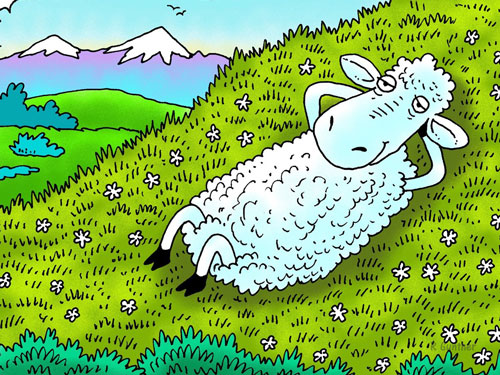
A Shepherd Looks at Psalm 23
In 1970, Phillip Keller wrote "A Shepherd Looks at Psalm 23" -- which has become a Christian classic and is still widely read today. A child of missionaries in Africa, Keller used his observations of shepherds and herds, combined with his life's work in agricultural and wildlife management, to look at the words and story of Psalm 23 through the eyes of a shepherd and sheep. Below are a few insights gleaned from Keller's book that teachers and children might find most helpful. You can see more extensive quotes here.
"Still waters"
When sheep are thirsty, they become restless and set out in search of water to satisfy their thirst. If not led to the good water supplies of clean, pure water, they will often end up drinking from the polluted potholes where they pick up such internal parasites as nematodes, liver flukes, or diseases.
"Lie down"
The strange thing about sheep is that because of their very make-up, it is almost impossible for them to be made to lie down unless four requirements are met: (1) they are free of all fear, (2) free from friction with others of their kind, (3) free of flies and pests so can they relax, (4) free from hunger.
"Restores my soul"
A "cast" sheep is an old English shepherd's term for a sheep that has turned over on its back and cannot get up again by itself. Lying on its back, its feet in the air, it flays away frantically struggling to stand up, without success. Sometimes it will bleat a little for help, but generally, it lies there lashing about in frightened frustration.
"Paths of righteousness"
Sheep are notorious creatures of habit. If left to themselves they will follow the same trails until they become ruts; graze the same hills until they turn to desert wastes; pollute their own ground until it is corrupt with disease and parasites. The greatest single safeguard which a shepherd has in handling his flock is to shift them from pasture to pasture periodically.
"Anoint my head with oil"
Shepherds in ancient times would apply a medicinal ointment to sheep noses and wounds to keep flies from laying eggs in them.
"Rod and Staff"
The meanings of the Hebrew words for "rod," SEBET, and "staff," MISHENA, are very special. The Hebrew word SEBET has the idea of a "stick." In the Old Testament the "stick" was used to count sheep (Leviticus 27:32). It was also used to protect the sheep from other animals. In the book of Proverbs the stick is used for discipline (Proverbs 13:24). SEBET has a sense of authority. The Hebrew word MISHENA has the idea of "something to lean on," "trust," "support," or "staff." Together, the two words paint a picture of a strong, protective shepherd whom we can trust. Sheep calm down in the presence of a shepherd.
Bible Background written by Neil MacQueen for the Rotation.org Writing Team
with input from the Team and Rotation.org Board of Directors.
Copyright 2019, Rotation.org Inc.
Images copyright Richard Gunther, used with permission, Creative Commons Attribution-NonCommercial 4.0 International License.


